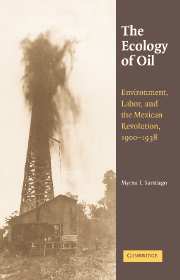Book contents
- Frontmatter
- Dedication
- Contents
- List of Maps, Figures, Tables, and Appendices
- Acknowledgments
- Introduction
- PART ONE THE HUASTECA BEFORE OIL
- PART TWO THE ECOLOGY OF OIL
- PART THREE CHALLENGING THE ECOLOGY OF OIL
- 5 “Coarse in Manner”: Mexican Oil Workers, 1905–1921
- 6 Revolutionaries, Conservation, and Wasteland
- 7 Revolution from Below: The Oil Unions, 1924–1938
- Conclusion
- Epilogue
- Appendices
- A Note on the Sources
- Archives Consulted
- Selected Bibliography
- Index
5 - “Coarse in Manner”: Mexican Oil Workers, 1905–1921
from PART THREE - CHALLENGING THE ECOLOGY OF OIL
Published online by Cambridge University Press: 05 March 2015
- Frontmatter
- Dedication
- Contents
- List of Maps, Figures, Tables, and Appendices
- Acknowledgments
- Introduction
- PART ONE THE HUASTECA BEFORE OIL
- PART TWO THE ECOLOGY OF OIL
- PART THREE CHALLENGING THE ECOLOGY OF OIL
- 5 “Coarse in Manner”: Mexican Oil Workers, 1905–1921
- 6 Revolutionaries, Conservation, and Wasteland
- 7 Revolution from Below: The Oil Unions, 1924–1938
- Conclusion
- Epilogue
- Appendices
- A Note on the Sources
- Archives Consulted
- Selected Bibliography
- Index
Summary
The world is full of socialists and anarchists.
John D. Rockefeller, 1905It is always the mixed breed who is unveracious, dishonest, and treacherous. It was the mixed breeds who composed the mobs in Tampico that cried death to the gringos. And many of these half-breeds, so crying, were the very employees of the gringos they wanted to kill and whose property they wanted to destroy.
Jack London, 1914The conditions that Tampico workers are subjected to [are] terrible…entire families don't eat every day…Conditions…created by the unmeasured ambition of the oil barons; what do they care about the needs and the sufferings of an entire people? What do they care about the life of the poor, if in the end the slaves are in the millions and it doesn't matter if they kill them through starvation to increase profits or make political gains, or they kill them in war to conquer new markets or protect their interests?
Andrés Araujo, Luz, October 23, 1918In 1941 Tina Sierra published a short novel about the oil industry in which she described the formation of a new segment of the Mexican working class. She wrote,
On the first payday, a Saturday, a man leaves the pay-room with a handkerchief full of pesos, heads straight to a clothing store (rather, a clothing tent of the myriad that appear on Saturdays improvised in front of pay-windows), there he buys a silk shirt, blue jeans, heavy shoes and a Texan hat. There you have an oil worker.
The cowboys who strutted out of improvised Huasteca stores on their first payday were indeed changed men. They belonged to a group of workers that experienced extraordinary growth numerically and politically in the first two decades of the twentieth century. By early 1921, the oil workers had grown to a peak of thirty-five thousand to fifty thousand men. They were a minority within a minority, a miniscule fraction of the 750,000 men and women who made up the Mexican working class in 1910, out of a total population of fifteen million. Nevertheless, what the oil workers lacked in size, they made up in bravado, as Sierra implied.
- Type
- Chapter
- Information
- The Ecology of OilEnvironment, Labor, and the Mexican Revolution, 1900–1938, pp. 205 - 255Publisher: Cambridge University PressPrint publication year: 2006



